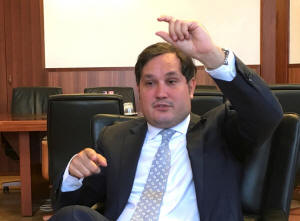|
With inflation topping 20% in September and still rising, and
the economy slowing, Prime Minister Viktor Orban's government
faces the challenge of curbing price growth while trying to
stave off a recession in 2023. It has already capped the prices
of fuel and basic foodstuffs and mortgage rates. Energy bills
are also capped for average-use households.
On Saturday it announced subsidies worth 150 billion forints
($362 million) for large companies to help investments that
improve energy efficiency, and expanded its scheme of capped
interest rates on loans with commercial banks bearing the costs.
Nagy said rates on business loans will be capped at the 3-month
interbank rate of June 28, which was 7.77% as opposed to the
current rate of 16.69%, after an emergency rate hike by the
central bank on Oct 14. The cap is effective until July 1, 2023,
similar to the existing cap on household mortgage rates, Nagy
said.
Nagy said the stock of variable-rate loans amounted to close to
2 trillion forints held by about 60,000 small firms, and the
measure aimed to avoid these businesses paying 20% or higher
rates on their loans.
"We would like to avoid the economy going into recession next
year and we have every chance to have 1% growth," Nagy told a
briefing.
"With this loan cap we want to prevent yet another shock to the
corporate sector stemming from a surge in their repayments."
In May the government announced windfall taxes worth 800 billion
forints on what it called "extra profits" earned by banks,
energy companies and other firms to plug a budget gap, hitting
Budapest stocks and rattling investors.
($1 = 413.9900 forints)
(Reporting by Krisztina Than; Editing by Kirsten Donovan)
[© 2022 Thomson Reuters. All rights
reserved.]
This material may not be published,
broadcast, rewritten or redistributed.
Thompson Reuters is solely responsible for this content.

|
|





